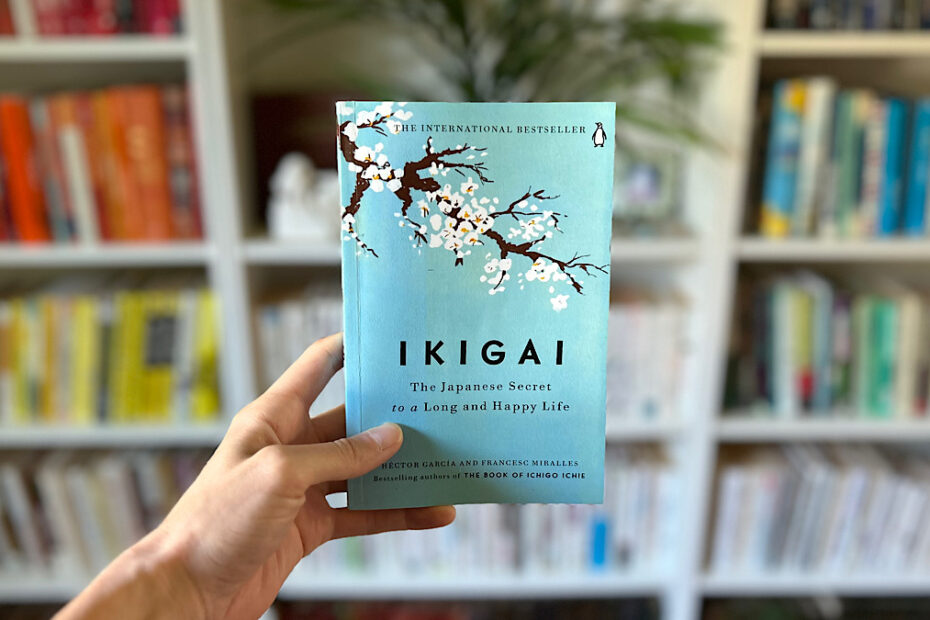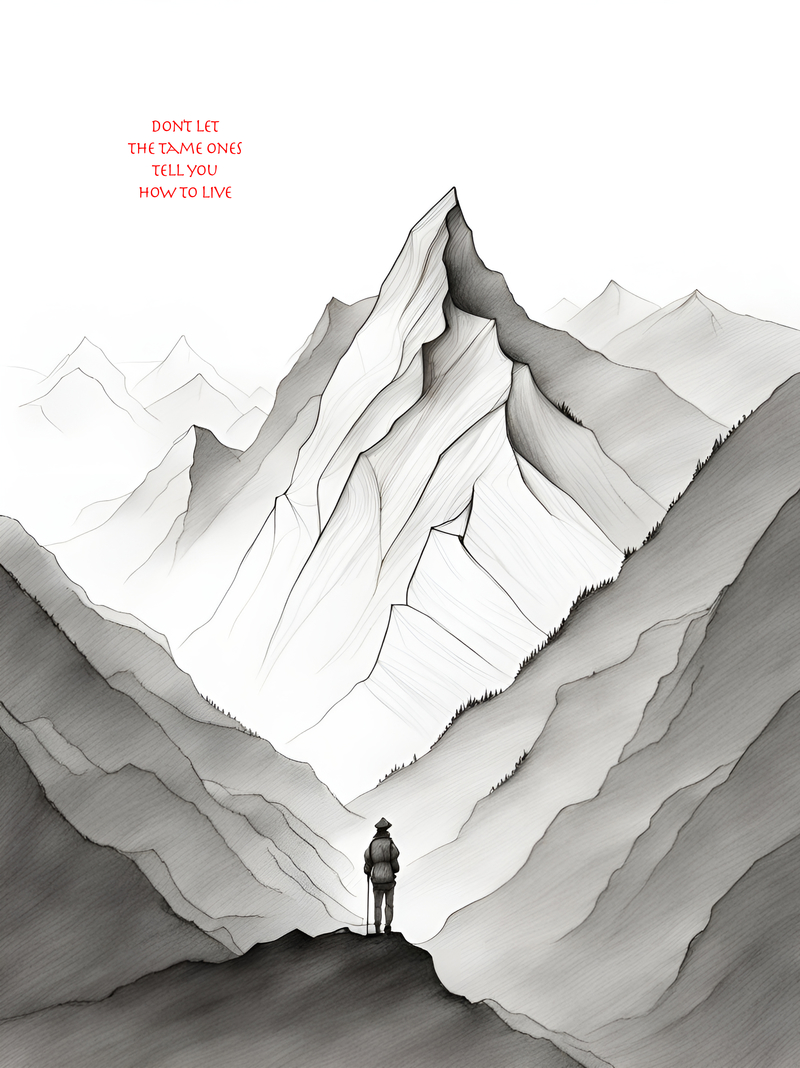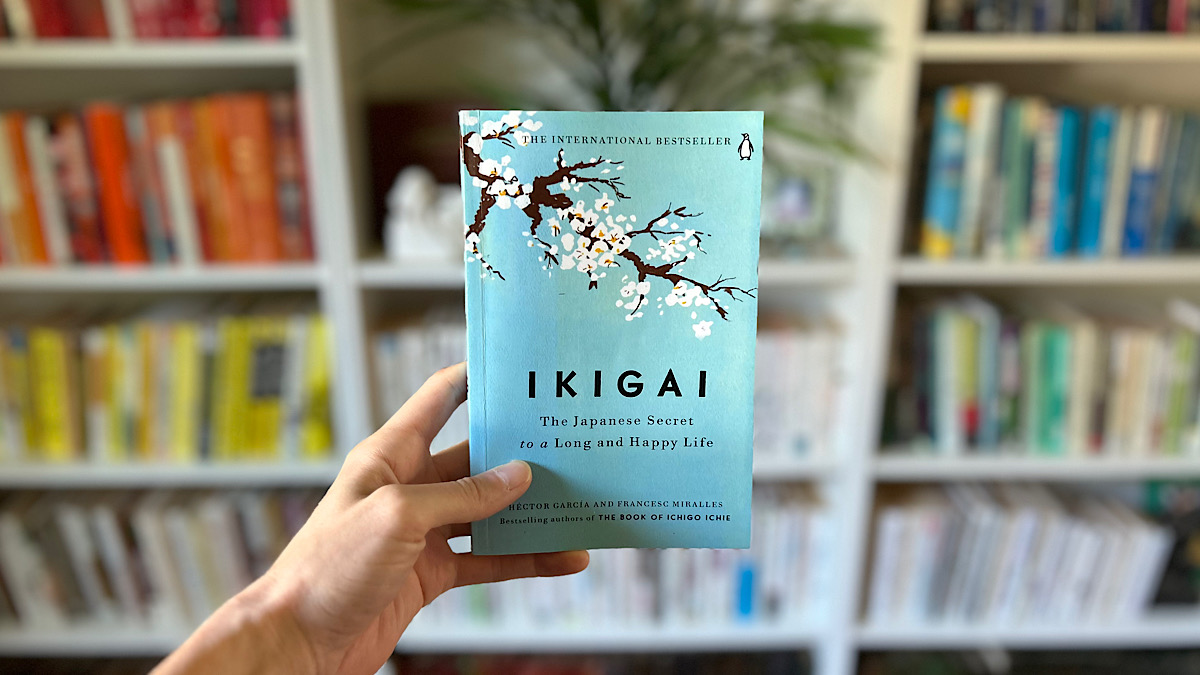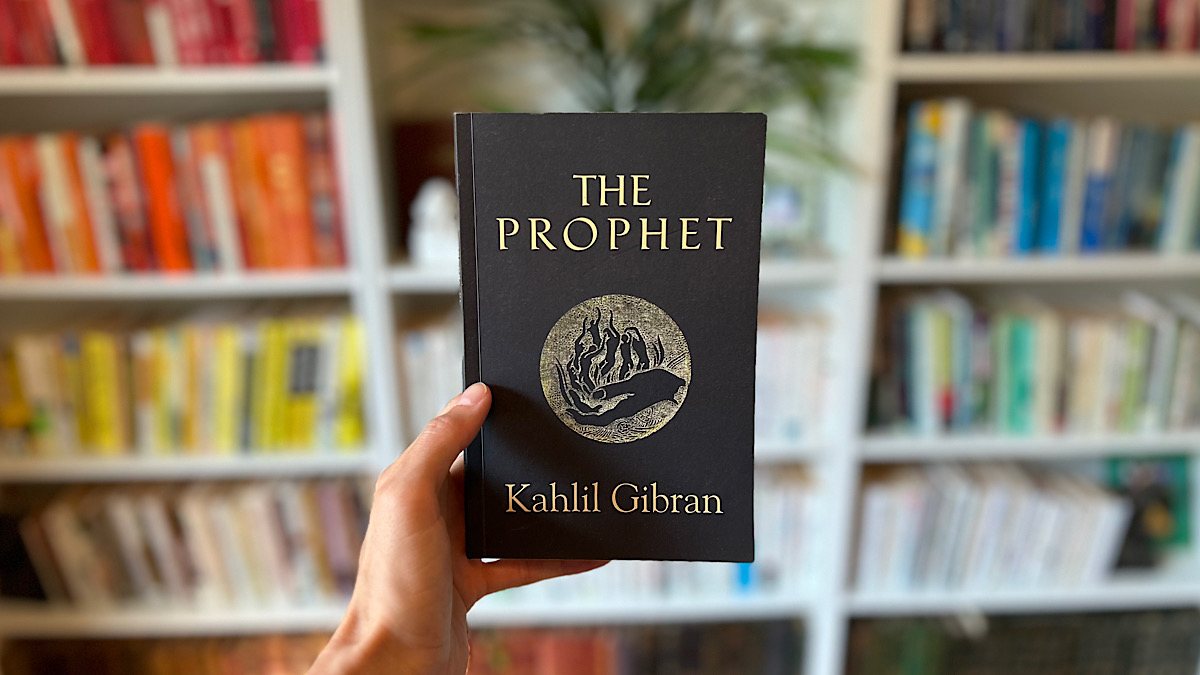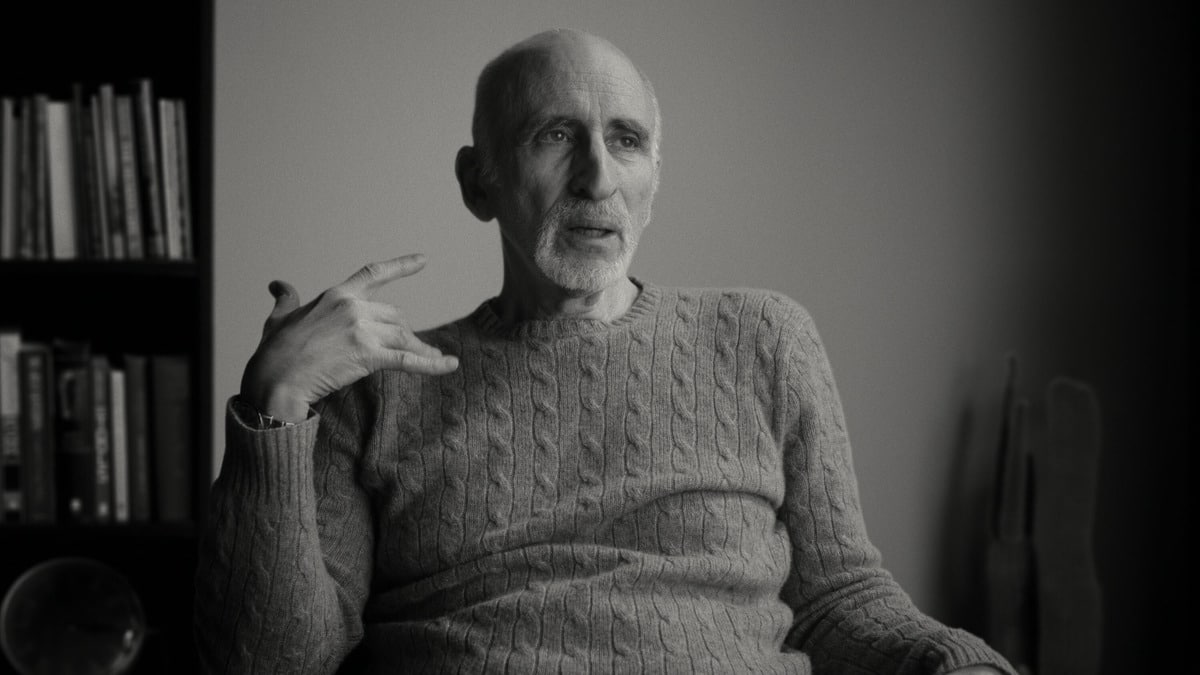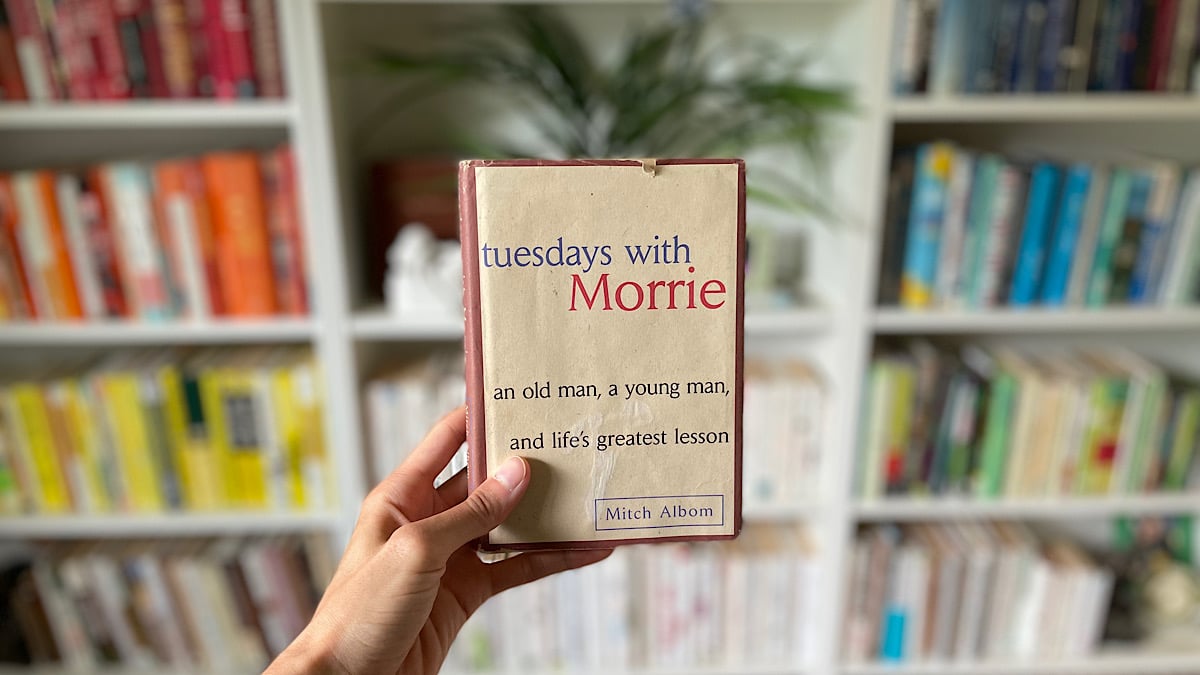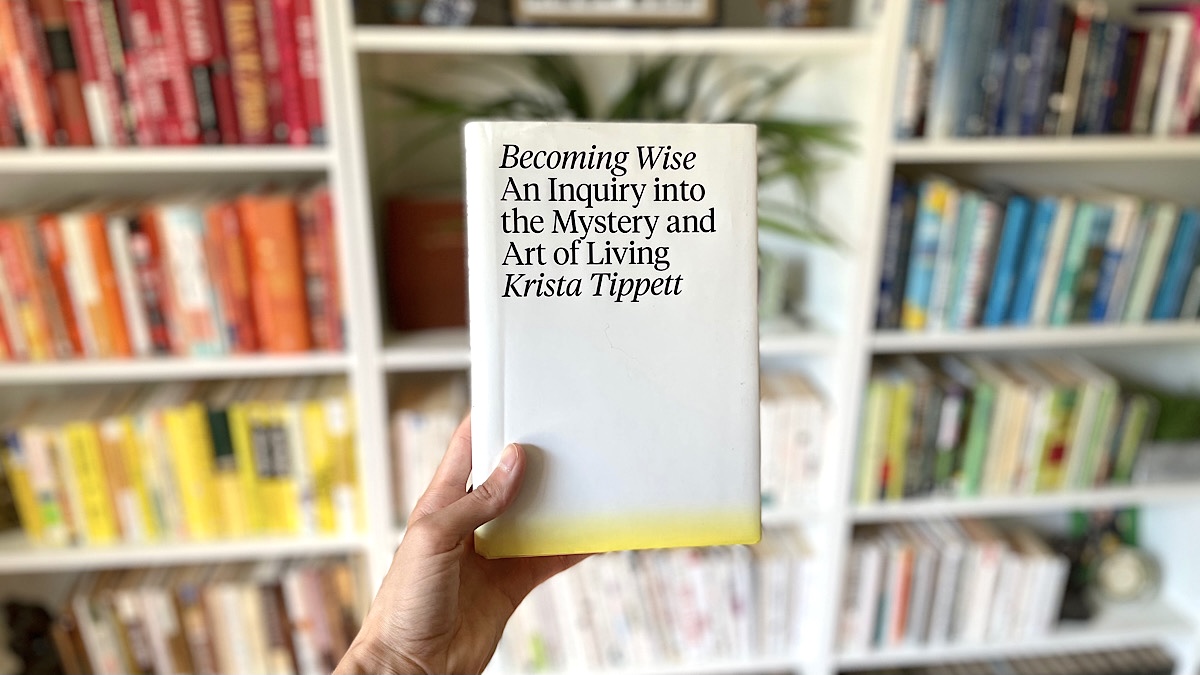Excerpt: What is Ikigai? Often translated as “a reason for being,” it’s a concept that—when fully understood—can add years and joy to your life…
Click Here to jump right to the list of 10 Rules of Ikigai!
Introduction: What Is Ikigai?
Ikigai is a Japanese concept that refers to what gives life value, meaning, or purpose. It’s often translated as “a reason for being” or “a reason to wake up in the morning”. And what makes this concept supremely appealing and worth exploring is that, according to the research done by the authors of the book, Ikigai—Héctor García and Francesc Miralles—discovering and cultivating your Ikigai plays an integral role in increasing both the length and overall happiness of your life.
That last sentence is worth reading again.
Here’s what García and Miralles did: they traveled to some of the world’s blue zones—areas with the highest percentage of 100-year-olds—and interviewed the residents to better understand what lead to such outlier living. A lot of what they discovered that they identified as having an impact can be intuited: what they eat, how they moved, how they worked, how they maintained social connections, etc. But, the last piece—the piece García and Miralles considered their “best kept secret”—was how they fostered and continued to nurture (well into their older ages) their ikigai.
To paint a more clear picture, ikigai can be described as the intersection between what you love, what you’re good at, what the world needs, and what you can be paid for. As you can see in the diagram below, an absence of even one of these dimensions can lead to feelings of uselessness (absence of serving a world need), emptiness (absence of doing what you love), uncertainty (absence of doing what you’re good at), or financial insecurity (absence of doing something that you can be paid for).
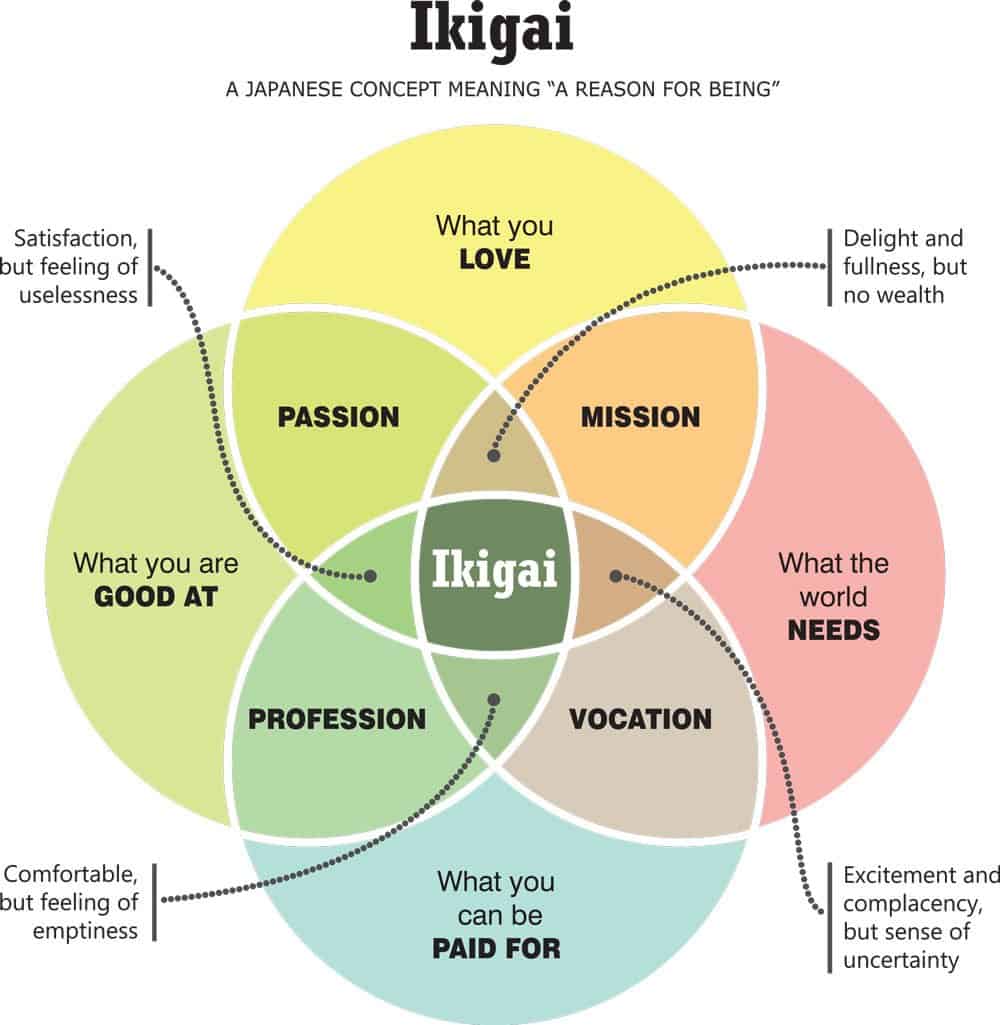
Which, in many modern societies, is only compounded and exacerbated when people choose to retire and cut themselves off from two, three, or even all four dimensions in their lives. While the image of sipping piña coladas on a tropical beach with people on call to serve your every need might sound appealing—the reality is, it leads to a depressive soup composed of all the feelings outlined above—no matter how luxurious or comfortable the lifestyle might initially feel.
In fact, in the part of the world where this concept was uncovered—Japan—it’s worth noting that there is no word in the Japanese language that even means retire in the English sense of the word. This is how integral the practice of staying “happily busy” is when living in one of these “blue zone” areas—they don’t even have a word to describe the practice! And, with such a compelling argument, one that’s not only research based but one that appeals to the intuitive understanding of the person (this makes complete sense to me), it might be worth seriously considering for your life and future living plans.
Below, you’ll find an excerpt from the book Ikigai: The Japanese Secret To A Long And Happy Life, that better describes not only the concept outlined above, but shares additional tid-bits worth noting and reflecting on. Identified in the book as the 10 Rules of Ikigai, these quick-hit insights—if you’re open-minded and deliberate—might just leave you with some ideas and action plans that’ll lead to an extension on life filled with more happiness in your days.
…And what could be worth more than that for your 10-minute investment?
NEW In The Shop: Don’t Let The Tame Ones Tell You How To Live [Poster]
Why We ♥ It: Some of the best advice I (Matt here) ever got was: don’t take life advice from people who aren’t living a life you want to live and don’t take criticism from people you wouldn’t go to for advice. I created this poster to act as a reminder to listen more closely to our role models and less closely to our critics, trolls, and tamed-comfort-zone-hugger acquaintances. It’s also a perfect gift for the outdoor adventurer, travel enthusiast, or solo explorer (or soon to be). Available in print or digital download. 👇🏼
...Want to advertise your book, product, or service? Send inquiries to matt@movemequotes.com.
Enter Héctor García and Francesc Miralles:
Our ikigai is different for all of us, but one thing we have in common is that we are all searching for meaning. When we spend our days feeling connected to what is meaningful to us, we live more fully; when we lose the connection, we feel despair.
Modern life estranges us more and more from our true nature, making it very easy for us to lead lives lacking in meaning. Powerful forces and incentives (money, power, attention, success) distract us on a daily basis; don’t let them take over your life.
Our intuition and curiosity are very powerful internal compasses to help us connect with our ikigai. Follow those things you enjoy, and get away from or change those you dislike. Be led by your curiosity, and keep busy by doing things that fill you with meaning and happiness. It doesn’t need to be a big thing: we might find meaning in being good parents or in helping our neighbors.
There is no perfect strategy to connecting with our ikigai. But what we learned from the Okinawans is that we should not worry too much about finding it.
Life is not a problem to be solved. Just remember to have something that keeps you busy doing what you love while being surrounded by the people who love you.
The 10 Rules of Ikigai
As distilled from the wisdom of the long-living residents of Ogimi; found on page 183 of the book:
- Stay active; don’t retire. Those who give up the things they love doing and do well lose their purpose in life. That’s why it’s so important to keep doing things of value, making progress, bringing beauty or utility to others, helping out, and shaping the world around you, even after your ‘official’ professional activity has ended.
- Take it slow. Being in a hurry is inversely proportional to quality of life. As the old saying goes, “Walk slowly and you’ll go far.” When we leave urgency behind, life and time take on new meaning.
- Don’t fill your stomach. Less is more when it comes to eating for long life, too. According to the 80 percent rule, in order to stay healthier longer, we should eat a little less than our hunger demands instead of stuffing ourselves.
- Surround yourself with good friends. Friends are the best medicine, there for confiding worries over a good chat, sharing stories that brighten your day, getting advice, having fun, dreaming… in other words, living.
- Get in shape for your next birthday. Water moves; it is at its best when it flows fresh and doesn’t stagnate. The body you move through life in needs a bit of daily maintenance to keep it running for a long time. Plus, exercise releases hormones taht make us feel happy.
- Smile. A cheerful attitude is not only relaxing—it also helps make friends. It’s good to recognize the things that aren’t so great, but we should never forget what a privilege it is to be in the here and now in a world so full of possibilities.
- Reconnect with nature. Though most people live in cities these days, human beings are made to be part of the natural world. We should return to it often to recharge our batteries.
- Give thanks. To your ancestors, to nature, which provides you with the air you breathe and the food you eat, to your friends and family, to everything that brightens your days and makes you feel lucky to be alive. Spend a moment every day giving thanks, and you’ll watch your stockpile of happiness grow.
- Live in the moment. Stop regretting the past and fearing the future. Today is all you have. Make the most of it. Make it worth remembering.
- Follow your ikigai. There is a passion inside you, a unique talent that gives meaning to your days and drives you to share the best of yourself until the very end. If you don’t know what your ikigai is yet, as Viktor Frankl says, your mission is to discover it.
If you enjoyed this excerpt from Ikigai: The Japanese Secret To A Long And Happy Life, you’ll definitely enjoy reading the book in full. It comes warmly recommended.

Book Overview: According to the Japanese, everyone has an ikigai—a reason for living. And according to the residents of the Japanese village with the world’s longest-living people, finding it is the key to a happier and longer life. Having a strong sense of ikigai—where what you love, what you’re good at, what you can get paid for, and what the world needs all overlap—means that each day is infused with meaning. It’s the reason we get up in the morning. In researching this book, the authors interviewed the residents of the Japanese village with the highest percentage of 100-year-olds—one of the world’s Blue Zones. Ikigai reveals the secrets to their longevity and happiness: how they eat, how they move, how they work, how they foster collaboration and community, and—their best-kept secret—how they find the ikigai that brings satisfaction to their lives. And it provides practical tools to help you discover your own ikigai.
Bonus: 6 Quotes from Ikigai [The Book]:
“The grand essentials to happiness in this life are something to do, something to love, and something to hope for.”
Washington Burnap, via Ikigai (Page 111)
“My secret to a long life is always saying to myself, ‘Slow down,’ and ‘Relax.’ You live much longer if you’re not in a hurry.”
Unknown, via Ikigai (Page 116)
“Looking back, our days in Ogimi were intense but relaxed—sort of like the lifestyle of the locals, who always seemed to be busy with important tasks but who, upon closer inspection, did everything with a sense of calm. They were always pursuing their ikigai, but they were never in a rush.”
Héctor García and Francesc Miralles, Ikigai (Page 110)
“Studies from the Blue Zones suggest that the people who live longest are not the ones who do the most exercise but rather the ones who move the most.”
Héctor García and Francesc Miralles, Ikigai (Page 110)
“Only staying active will make you want to live a hundred years.”
Japanese proverb, via Ikigai
“There is, in fact, no word in Japanese that means retire in the sense of ‘leaving the workforce for good’ as in English. According to Dan Buettner, a National Geographic reporter who knows the country well, having a purpose in life is so important in Japanese culture that our idea of retirement simply doesn’t exist there.”
Héctor García and Francesc Miralles, Ikigai (Page 10)
Read Next:
NEW In The Shop: Don’t Let The Tame Ones Tell You How To Live [Poster]
Why We ♥ It: Some of the best advice I (Matt here) ever got was: don’t take life advice from people who aren’t living a life you want to live and don’t take criticism from people you wouldn’t go to for advice. I created this poster to act as a reminder to listen more closely to our role models and less closely to our critics, trolls, and tamed-comfort-zone-hugger acquaintances. It’s also a perfect gift for the outdoor adventurer, travel enthusiast, or solo explorer (or soon to be). Available in print or digital download. 👇🏼
...Want to advertise your book, product, or service? Send inquiries to matt@movemequotes.com.

Written by Matt Hogan
Founder of MoveMe Quotes. On a mission to help busy people do inner work—for better mental health; for healing; for personal growth. Find me on Twitter / IG / Medium. I also share daily insights here. 🌱
It has taken me 1,000’s of hours to build this free library for you. If it has helped you, you can support my continued effort here. ☕️
